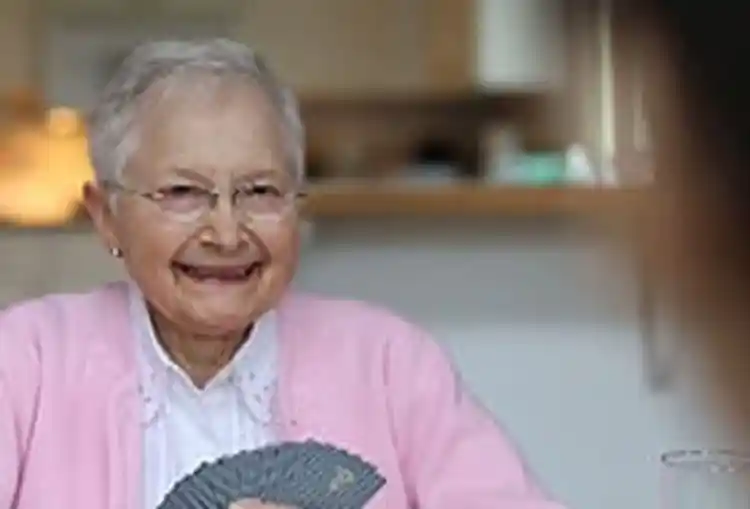Alzheimers: Household Tips for Caregivers

Hide Video Transcript
Video Transcript
[MUSIC PLAYING]
Making sure that the environment is well-lit, not cluttered, not dangerous is critical to the overall well-being. You know, the worst thing that can happen is a fall. And if things can't be moved all that close, are there tools, is there equipment that you can get for the person that will allow the person to get to things that he or she couldn't get to? So little grab hooks for getting things off shelves or pulling socks on. There are a remarkable number of tools and pieces of equipment that are around to help people do things when they're a little less than able to do it.
If one, as a caregiver, wants to maintain a level of activity and enjoyment and what not, but sees that the capacity for doing that independently has diminished, then find out ways to lighten the load. Get help. Maybe you have to hire somebody, maybe some neighbors will come in, friends will come in to help with some basic things.
One of the things that we try to tell caregivers is to be a lot more tolerant and less demanding. And that can apply to things like household cleanliness, right? So maybe Mom kept a meticulous house. But you've noticed that she's letting things slip. How important is that? So long as there's nothing imminently dangerous and it isn't bothering the person, then you can clean up behind the person, not make a fuss, not make a big deal.
The range of assistive devices available to promote independence among older persons is remarkable. If one thinks about bathing, for example. There's ways of taking a traditional tub and making a lot more elder friendly. So safety bars and grab bars for getting in and feeling stable, really good, safe step ladders for getting in to a tub are available as are bathing chairs.
Toileting and just the act of standing and sitting, muscles in the legs and thighs weaken. Another good reason to remain active. But you can get bars that are either free standing that you can attach to the floor or if there's some kind of a wall that helps with getting up and getting down. If one can afford a consult from an occupational therapist, a person like that can come in, assess the person's capacity, assess the environment, recommend the kinds of devices.
The notion of being a caregiver, I think, is an important and delicate one. And one of the places that's very important to start is not to make the assumption, I'm going to be taking care of somebody. I think it might better start with the notion, how can I partner with whoever it is, my parent, to ensure that he or she has the life he or she wants?
And so whether it's helping to straighten out the environment, to promote activity, to address independence with limitations, a conversation earlier rather than later, that says why do you want? And how can I help you? And don't tell me you don't want to be a burden on me. Let's not have that conversation. I want to help and I want you to be healthy. How can I do it?
ANNOUNCER
Caring for an elderly loved one can be a juggling act. But here are some simple tips that can help you manage. KEN HEPBURN
The principal I would suggest for organizing the environment for an older person is to tailor it or fit it to the person's capacities. So read what the person is able to do. If mobility is a problem, then gathering things closer to the person so that whatever activities the person wants to engage in or needs to engage in, those objects are at hand. Making sure that the environment is well-lit, not cluttered, not dangerous is critical to the overall well-being. You know, the worst thing that can happen is a fall. And if things can't be moved all that close, are there tools, is there equipment that you can get for the person that will allow the person to get to things that he or she couldn't get to? So little grab hooks for getting things off shelves or pulling socks on. There are a remarkable number of tools and pieces of equipment that are around to help people do things when they're a little less than able to do it.
If one, as a caregiver, wants to maintain a level of activity and enjoyment and what not, but sees that the capacity for doing that independently has diminished, then find out ways to lighten the load. Get help. Maybe you have to hire somebody, maybe some neighbors will come in, friends will come in to help with some basic things.
One of the things that we try to tell caregivers is to be a lot more tolerant and less demanding. And that can apply to things like household cleanliness, right? So maybe Mom kept a meticulous house. But you've noticed that she's letting things slip. How important is that? So long as there's nothing imminently dangerous and it isn't bothering the person, then you can clean up behind the person, not make a fuss, not make a big deal.
The range of assistive devices available to promote independence among older persons is remarkable. If one thinks about bathing, for example. There's ways of taking a traditional tub and making a lot more elder friendly. So safety bars and grab bars for getting in and feeling stable, really good, safe step ladders for getting in to a tub are available as are bathing chairs.
Toileting and just the act of standing and sitting, muscles in the legs and thighs weaken. Another good reason to remain active. But you can get bars that are either free standing that you can attach to the floor or if there's some kind of a wall that helps with getting up and getting down. If one can afford a consult from an occupational therapist, a person like that can come in, assess the person's capacity, assess the environment, recommend the kinds of devices.
The notion of being a caregiver, I think, is an important and delicate one. And one of the places that's very important to start is not to make the assumption, I'm going to be taking care of somebody. I think it might better start with the notion, how can I partner with whoever it is, my parent, to ensure that he or she has the life he or she wants?
And so whether it's helping to straighten out the environment, to promote activity, to address independence with limitations, a conversation earlier rather than later, that says why do you want? And how can I help you? And don't tell me you don't want to be a burden on me. Let's not have that conversation. I want to help and I want you to be healthy. How can I do it?
